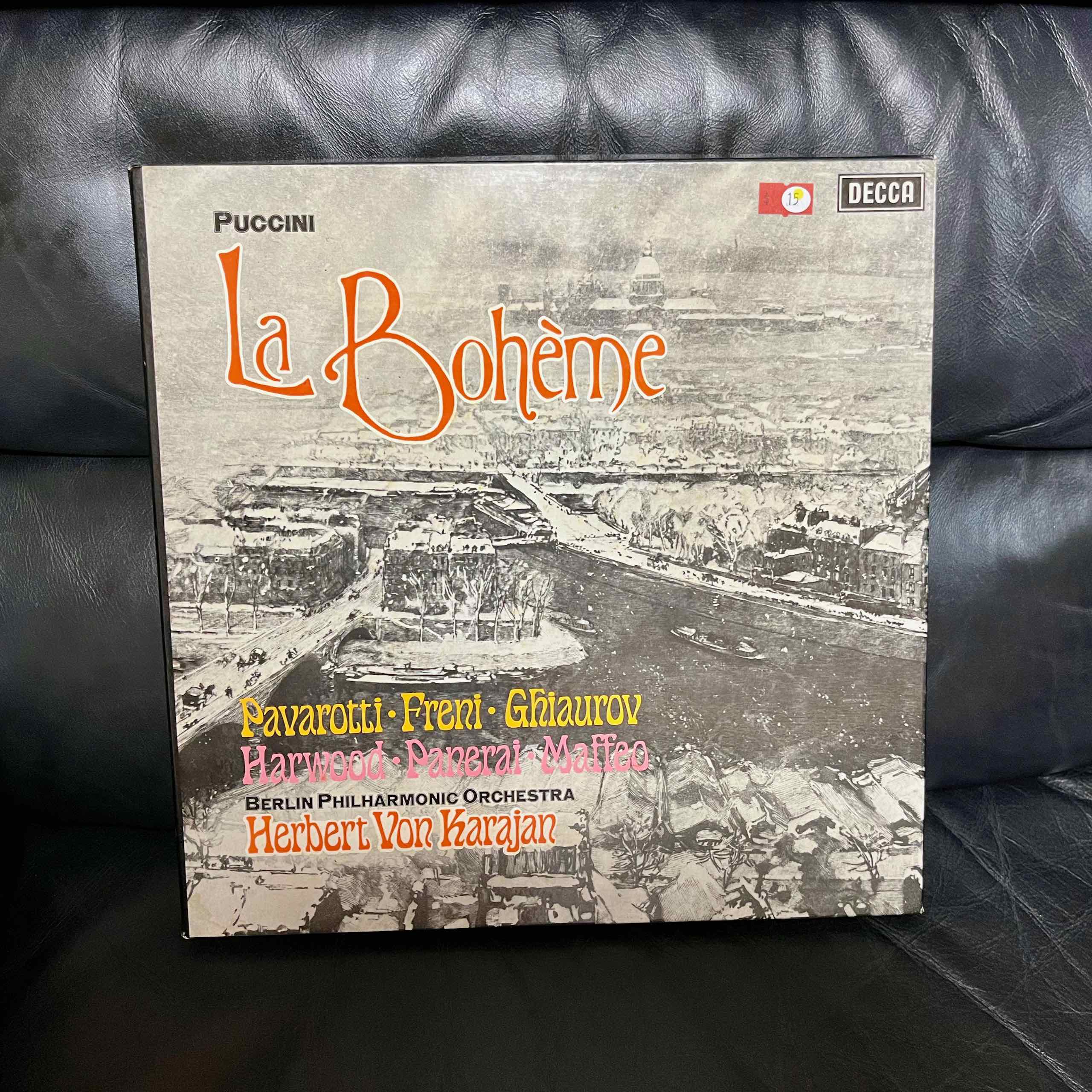
La Boheme (Karajan) LP set
Long sought after recording, found in Newtown
Friday 20 January 2023 at 7:00:00 pm AEDT 5 min readPlease click on any photo to view in a lightbox. Use arrow keys or swipe to navigate.
 La Boheme
La Boheme .DDeg3bZR.jpeg) La Boheme (1)
La Boheme (1) Guess what I found in Newtown? An original 1973 UK pressing of La Boheme conducted by Karajan with the Berlin Philharmonic and featuring Pavarotti and Freni in their prime.
Gramophone magazine hailed this as the greatest La Boheme recording ever made. I wont disagree, even though I have a soft spot for the 1959 Serafin recording with Tebaldi. In any case, I have been searching for this LP set for most of my life.
It is in good condition, and comes with the libretto. Even better, it is quite moldy - which is a good sign for record collectors. Mold means nobody has played the record in years, and often the LPs will sound excellent after cleaning.
Sure enough, I was very happy after playing back Sides 3 and 4 (corresponding to Acts 3 and 4).
Although I am generally not a fan of Karajan for Italian operas (I find him a bit too ponderous and not “Italian” enough), he is perfect for Acts 3 and 4 and the interpretation and performance simply cannot be faulted.
He is in absolute control of the orchestra and Germanic precision wins over Italian passion as every note sounds perfectly crafted, and yet totally in place and in context with the other notes.
Karajan is smart and humble enough to work in sympathy with the singers and the orchestra is never in competition with them. He gives space to allow the singers to express themselves fully, and never have I heard more dynamic range in the vocals than in this recording.
This recording is proof of John Culshaw’s thesis that sometimes it is better to listen to an opera recording rather than experiencing it live on stage. Made in the heyday of operatic studio recordings, this was specially commissioned by Decca and recorded with beautiful acoustics at the Jesus Christus Kirche in Berlin. Because the singers know it is a studio recording and the mics will capture every breath faithfully, they are brave enough to vary their dynamic range all the way down to a whisper, and hearing this on an LP is a revelation compared to the muddy and indistinct CD.
Pavarotti in particular demonstrates just why he was regarded as the world’s greatest tenor. He manages to evoke emotion in every note - you know exactly how he is feeling without requiring an understanding of Italian. His voice is perfect, beautifully crafted and absolutely sublime.
Freni was in her prime and amply demonstrates why she is famous for her Mimi, and she is such a professional she takes the trouble to evoke some very realistic TB sounding coughs whilst maintaining a sweet singing voice.
Act 3 is wonderful demonstration of how restrained the singers and the orchestra are. Rather than projecting and belting out the lines, the singers evoke such tenderness and regret. The moment that Rodolfo changes from criticising Mimi to admitting he is terrified she is gravely ill and likely to die soon, then realising Mimi is nearby and overheard every word - that part always sends me to tears. The quartet, where Puccini delicately balances between comedy and pathos, jealousy and love, loss and forgiveness, recrimination and hope - always strike me with a sense of wonder how Puccini can juggle all these emotions at once - is perfectly rendered and not overpowering.
Act 4 has to be the most perfect performance ever. The orchestra knows just when to be loud and when to be almost whisper quiet. The timing of singers are impeccable and one can imagine every scene perfectly, with even the swordplay sounding scintillating across the soundstage.
Some critics have complained that Puccini’s inclusion of Colline’s ode to his coat is disruptive and badly timed, and simply an excuse for a baritone aria. I disagree, Puccini has always been a genius, and he took us to the brink of pathos with the arrival of Musetta, so Colline’s aria takes us back from the edge and give us a bit of breathing space before the final assault on the emotions.
Karajan and Ghiaurov implicitly understand this and Colline saying goodbye to his coat is sung in even, calming tones with the orchestra providing a rhythmic and measured accompaniment, rather than for comical effect.
When Schaunard and Colline leave, the orchestra picks up just enough for a brief and enchanting prelude before Mimi sings “Sono andati” At this point I am usually crying like a baby.
Karajan and the singers demonstrate from here on exactly why this recording is so reknowned and acclaimed. The tempo slows down to a crawl, the characters practically whisper to each other, and it almost feels time, and the universe, has paused. So many stage productions fluff this scene, as the singers feel obliged to project their lines to the whole audience, and often the conductor is impatient as we are nearing the end of the opera.
Pavarotti’s sense of timing and enunciation is superb. The moment he learns that Mimi has died - the voice changes from hope and optimism, to shock, to despair and grief, accompanied by racking sobs. Karajan chooses this moment, at the closing of the opera, to bring the orchestra to a full crescendo, so our own tears are soothed by a dramatic and sonorous conclusion.